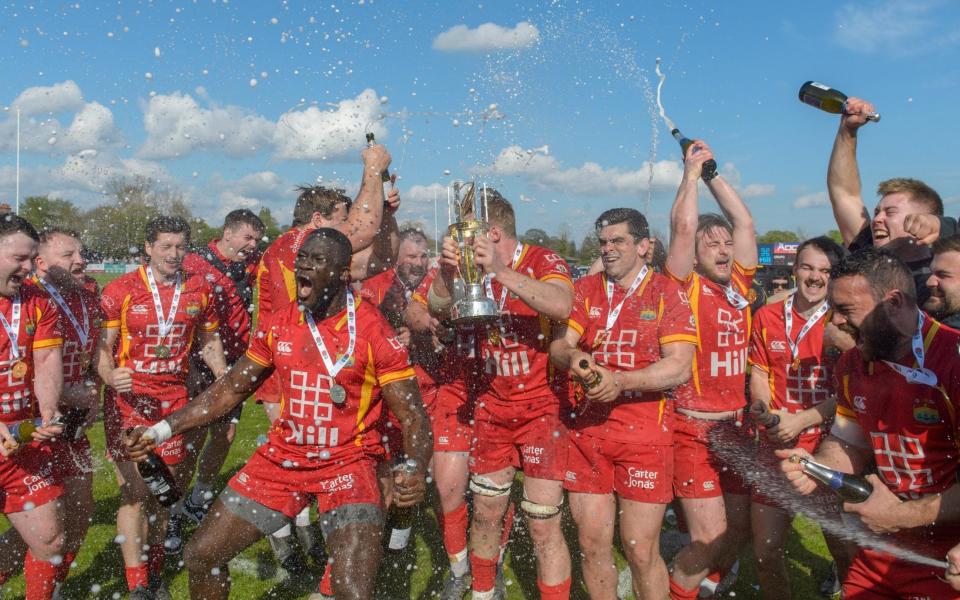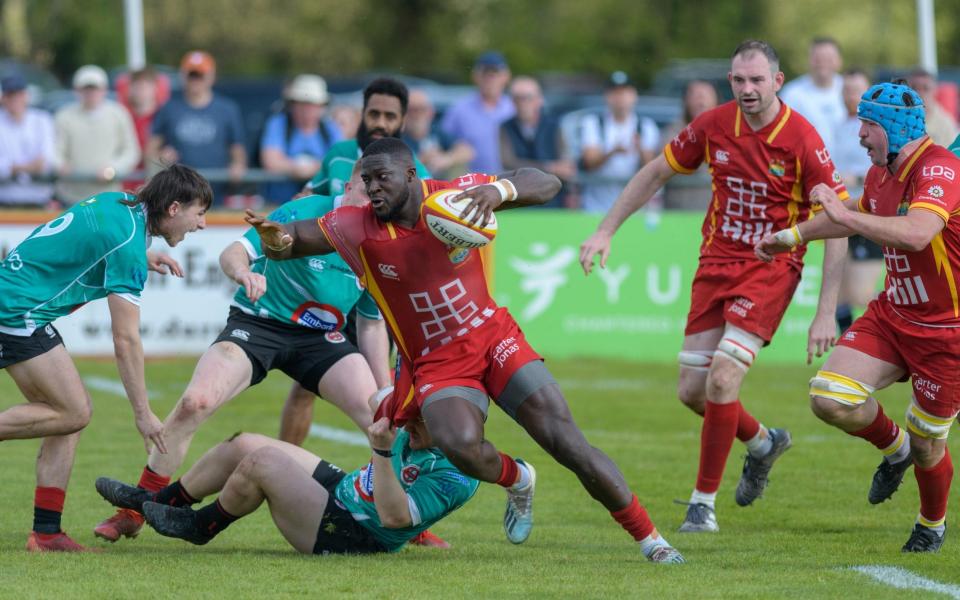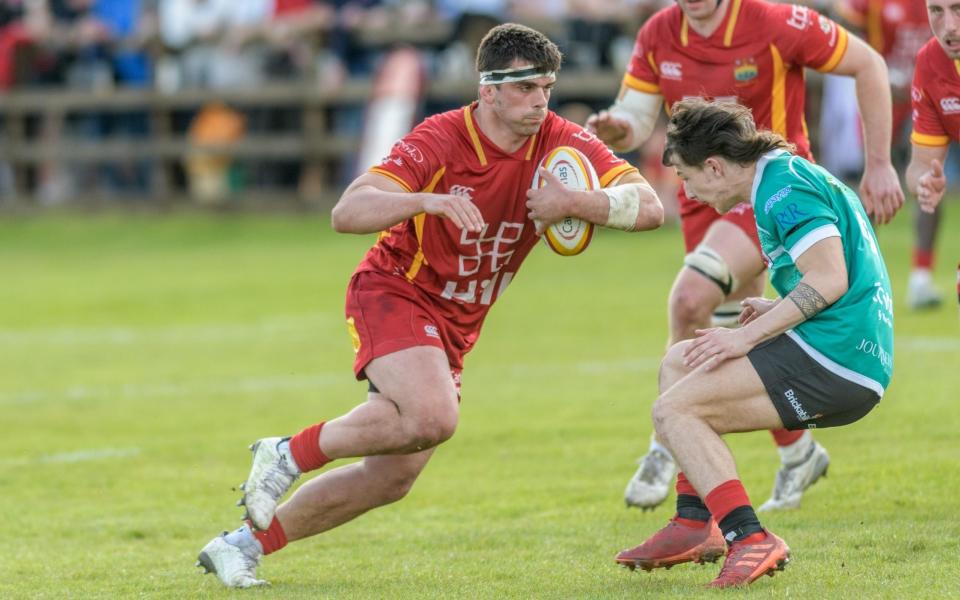
Broadcast deals and bombast may be the preserve of the Premiership for now, but there can be no debate about the most compelling competition in English rugby union this season. National One, the pyramid’s third tier, was a truly wild ride.
Emerging as champions, prevailing after an extraordinary three-way title race by virtue of drawing one more game than their nearest rivals, Cambridge have earned the right to spend their centenary year in the Championship. They have never before reached such heights.
Improving on 2022’s fourth place had been the initial aim. That would have constituted another step forward under Richie Williams, who has overseen steady progress since arriving five years ago and narrowly avoiding relegation into National Two. The true gauge of this season’s drama was how the frontrunners fared against one another.
“We were always chasing down Rams and Sale [FC] in a three-horse race,” Williams explains. “After Christmas, Rosslyn Park just dropped a bit, leaving us three chasing promotion and the biggest thing to take away was that all three teams beat one another.
“We beat Sale twice, Sale beat Rams twice and Rams beat us twice. I think any one of those teams would have deserved to win the league, we just found some real form in the last two months. We were never at the top of the league until the end of the last game.”
Following a 33-27 loss to Rams, Cambridge peeled off 10 straight victories to top the table by the barest of margins. They and Rams finished level on points, with 114 each, and Sale amassed 113. First and second both won 22 of their 26 fixtures but were separated by Cambridge’s single draw, away to lowly Leeds Tykes, eventually relegated with Hull and Esher, in December.
It is worth highlighting that Williams’ men earned the best points difference. Illustrating a resourceful and well-rounded approach, wing Kwaku Asiedu was the league’s most prolific try-scorer with 33 and hooker Ben Brownlee was next down that ladder with 28, benefitting from a devastating maul.

“Last season we might have been described as a bit one-dimensional and that probably worked against us,” Williams admits. “We made a couple of changes to how we attack in phase-play and we ended up scoring the most points in National One. We ended up with 1,000, from a good combination of our set piece and our attacking game.”
Anthony Allen, the former England centre and now a burgeoning coach with Loughborough University and Coventry on his CV, came in last summer to oversee defence. Neil Harris, previously with Saracens Women and the USA, took charge of set-piece matters. Having helped out with support staff since his mid-teens, Carrick Blake has been promoted to the role of head analyst. Williams calls him a “success story” with a “fantastic eye”.
Two results stick out from an unforgettable promotion campaign. The 35-19 triumph at Sale in January, when the game was moved from Heywood Road to Carrington and snow had to be scraped off the pitch, is heralded by Williams as “pivotal”. In their penultimate outing, Cambridge bagged a bonus-point victory in Plymouth, where Rams had been overturned five weeks previously. That left a date with Birmingham Moseley on April 29, their game in hand over others, for Cambridge to seal a passage to the Championship. Four tries and a win were essential. They stormed home 59-10.

Williams hails National One, containing teams spread from the south west up to Darlington Mowden Park, as “a fantastic league” that has been “very competitive for the last three seasons with clubs operating on a very similar budget”. There is no salary cap, though clubs found to have surpassed a payment threshold of £250,000 become ineligible for certain benefits from the Rugby Football Union. The semi-professional landscape often sees players kept on a retainer and given match fees, with some helped into employment by a club’s corporate partners. Burned by overreaching in the past, Cambridge are determined to stay sustainable.
Next season in National One will be particularly intriguing given that it is the highest level at which the legal tackle-height is dropping. Cambridge have escaped that initiative for now, of course. Williams wants to maintain something of an “amateur ethos” in the Championship, though will probably beef up the training schedule from two sessions a week to three.
Originally from Neath, Williams is a well-travelled coach. He headed up the England Counties Under-20 programme for five years and had a spell with the Hungarian rugby union. A fond memory of the latter was coordinating a sevens team at a two-day tournament in Milton Keynes. Sparse funds meant Hungary’s players had to sleep in the venue’s changing rooms. They still won.
Coaching in the Championship has been a personal ambition for Williams. While acknowledging that the second tier has “a league within a league” of stronger sides at its summit, he points out that recent arrivals from National One have been competitive.
Caldy came tenth of 12 teams this season, winning seven matches. Hartpury, Coventry and Ampthill, promoted from third to second tiers in 2017, 2018 and 2019, respectively, have established themselves as Championship outfits. Williams promises that an “invigorated” Cambridge squad will endeavour to do the same, even against the might of Jersey Reds and Ealing Trailfinders. They also have the extra carrot of a crack at the inaugural Premiership Cup.
“The Ealing and Jersey games will be huge occasions for the club and the cherry on top will be coming up against some Premiership teams in the Cup,” Williams finishes.
“That’s the exciting part, the romance that rugby still has. Things like that keep people engaged. We’ve said to the players; that we will be making a little bit of history whatever happens. We’ve been on this remarkable journey and we’ll attack whatever lies ahead next year.”
Article courtesy of
Source link